Financial Accounting (MAA716): Earnings Management Report Analysis
VerifiedAdded on 2023/01/18
|6
|1196
|72
Report
AI Summary
This report delves into the concept of earnings management, where managers strategically choose accounting policies to achieve specific objectives. It explores various incentives that drive this practice, including contracting, political, regulatory, stock market, and taxation incentives. The report examines how these incentives can motivate managers to manipulate financial information, potentially leading to unethical practices and misleading stakeholders. It provides examples of companies like Lucent Technologies and Enron Corporation, illustrating how these incentives have played out in real-world scenarios. The conclusion emphasizes the importance of ethical financial reporting and the potential consequences of earnings management. The report references various academic sources to support its analysis.
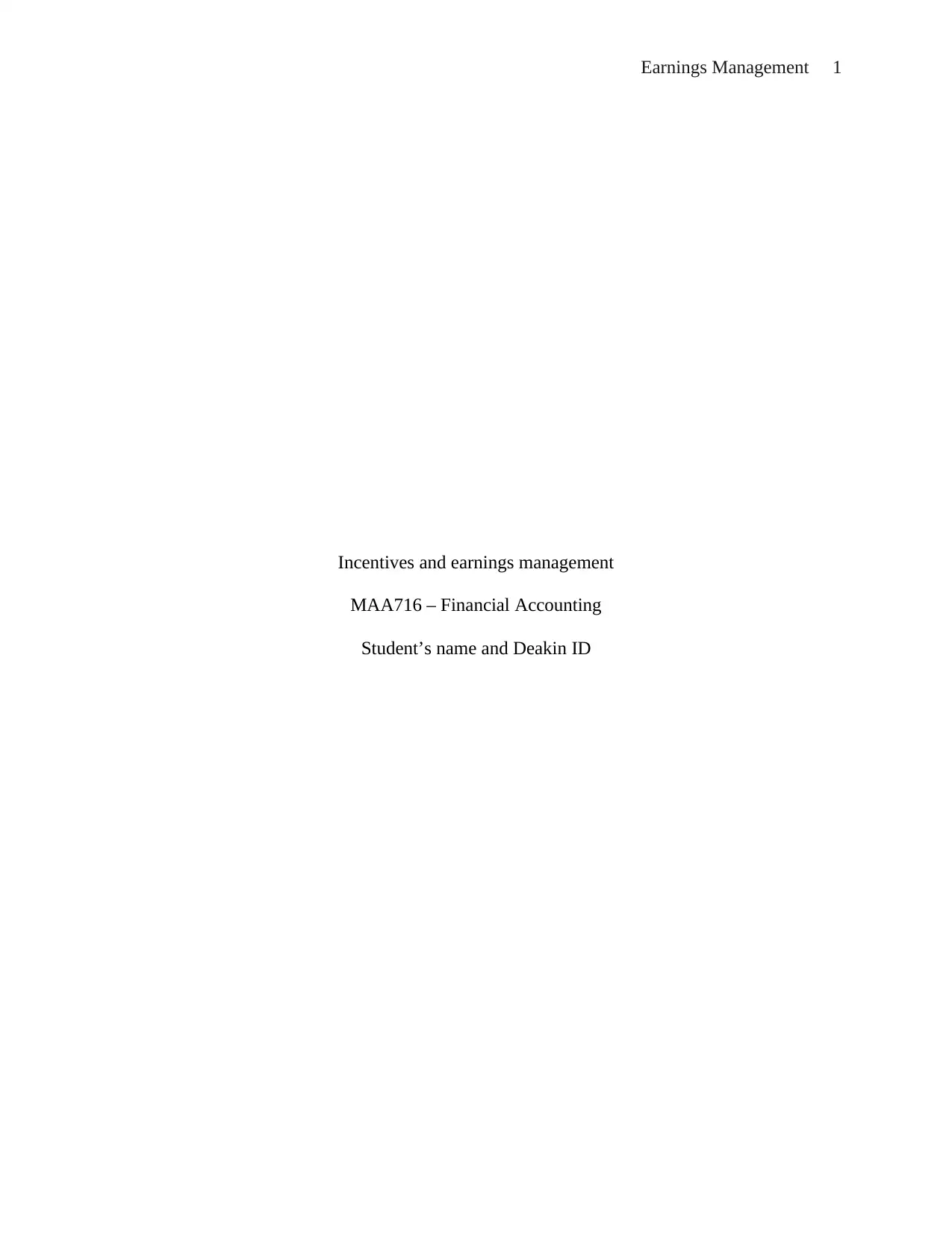
Earnings Management 1
Incentives and earnings management
MAA716 – Financial Accounting
Student’s name and Deakin ID
Incentives and earnings management
MAA716 – Financial Accounting
Student’s name and Deakin ID
Paraphrase This Document
Need a fresh take? Get an instant paraphrase of this document with our AI Paraphraser
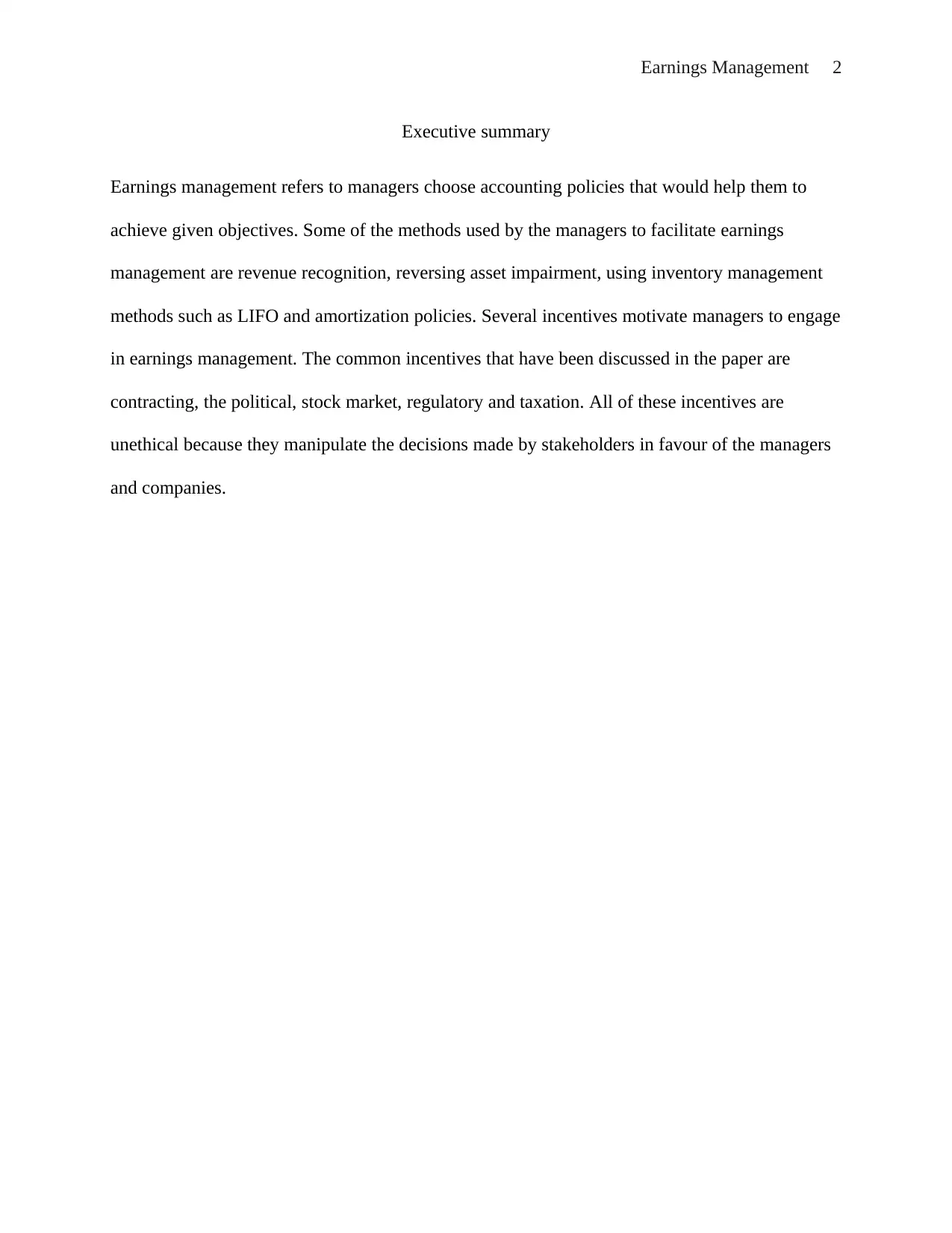
Earnings Management 2
Executive summary
Earnings management refers to managers choose accounting policies that would help them to
achieve given objectives. Some of the methods used by the managers to facilitate earnings
management are revenue recognition, reversing asset impairment, using inventory management
methods such as LIFO and amortization policies. Several incentives motivate managers to engage
in earnings management. The common incentives that have been discussed in the paper are
contracting, the political, stock market, regulatory and taxation. All of these incentives are
unethical because they manipulate the decisions made by stakeholders in favour of the managers
and companies.
Executive summary
Earnings management refers to managers choose accounting policies that would help them to
achieve given objectives. Some of the methods used by the managers to facilitate earnings
management are revenue recognition, reversing asset impairment, using inventory management
methods such as LIFO and amortization policies. Several incentives motivate managers to engage
in earnings management. The common incentives that have been discussed in the paper are
contracting, the political, stock market, regulatory and taxation. All of these incentives are
unethical because they manipulate the decisions made by stakeholders in favour of the managers
and companies.
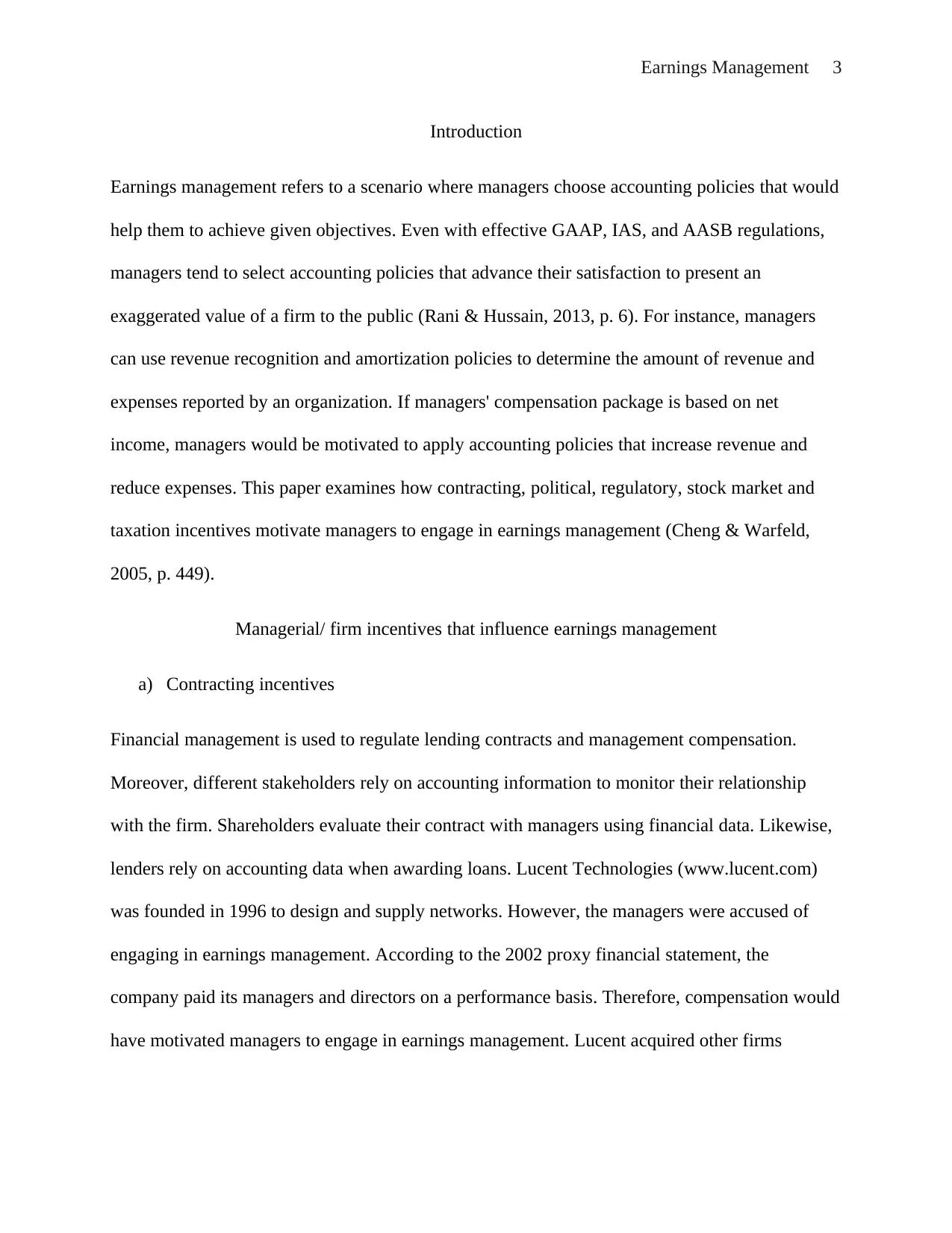
Earnings Management 3
Introduction
Earnings management refers to a scenario where managers choose accounting policies that would
help them to achieve given objectives. Even with effective GAAP, IAS, and AASB regulations,
managers tend to select accounting policies that advance their satisfaction to present an
exaggerated value of a firm to the public (Rani & Hussain, 2013, p. 6). For instance, managers
can use revenue recognition and amortization policies to determine the amount of revenue and
expenses reported by an organization. If managers' compensation package is based on net
income, managers would be motivated to apply accounting policies that increase revenue and
reduce expenses. This paper examines how contracting, political, regulatory, stock market and
taxation incentives motivate managers to engage in earnings management (Cheng & Warfeld,
2005, p. 449).
Managerial/ firm incentives that influence earnings management
a) Contracting incentives
Financial management is used to regulate lending contracts and management compensation.
Moreover, different stakeholders rely on accounting information to monitor their relationship
with the firm. Shareholders evaluate their contract with managers using financial data. Likewise,
lenders rely on accounting data when awarding loans. Lucent Technologies (www.lucent.com)
was founded in 1996 to design and supply networks. However, the managers were accused of
engaging in earnings management. According to the 2002 proxy financial statement, the
company paid its managers and directors on a performance basis. Therefore, compensation would
have motivated managers to engage in earnings management. Lucent acquired other firms
Introduction
Earnings management refers to a scenario where managers choose accounting policies that would
help them to achieve given objectives. Even with effective GAAP, IAS, and AASB regulations,
managers tend to select accounting policies that advance their satisfaction to present an
exaggerated value of a firm to the public (Rani & Hussain, 2013, p. 6). For instance, managers
can use revenue recognition and amortization policies to determine the amount of revenue and
expenses reported by an organization. If managers' compensation package is based on net
income, managers would be motivated to apply accounting policies that increase revenue and
reduce expenses. This paper examines how contracting, political, regulatory, stock market and
taxation incentives motivate managers to engage in earnings management (Cheng & Warfeld,
2005, p. 449).
Managerial/ firm incentives that influence earnings management
a) Contracting incentives
Financial management is used to regulate lending contracts and management compensation.
Moreover, different stakeholders rely on accounting information to monitor their relationship
with the firm. Shareholders evaluate their contract with managers using financial data. Likewise,
lenders rely on accounting data when awarding loans. Lucent Technologies (www.lucent.com)
was founded in 1996 to design and supply networks. However, the managers were accused of
engaging in earnings management. According to the 2002 proxy financial statement, the
company paid its managers and directors on a performance basis. Therefore, compensation would
have motivated managers to engage in earnings management. Lucent acquired other firms
⊘ This is a preview!⊘
Do you want full access?
Subscribe today to unlock all pages.

Trusted by 1+ million students worldwide
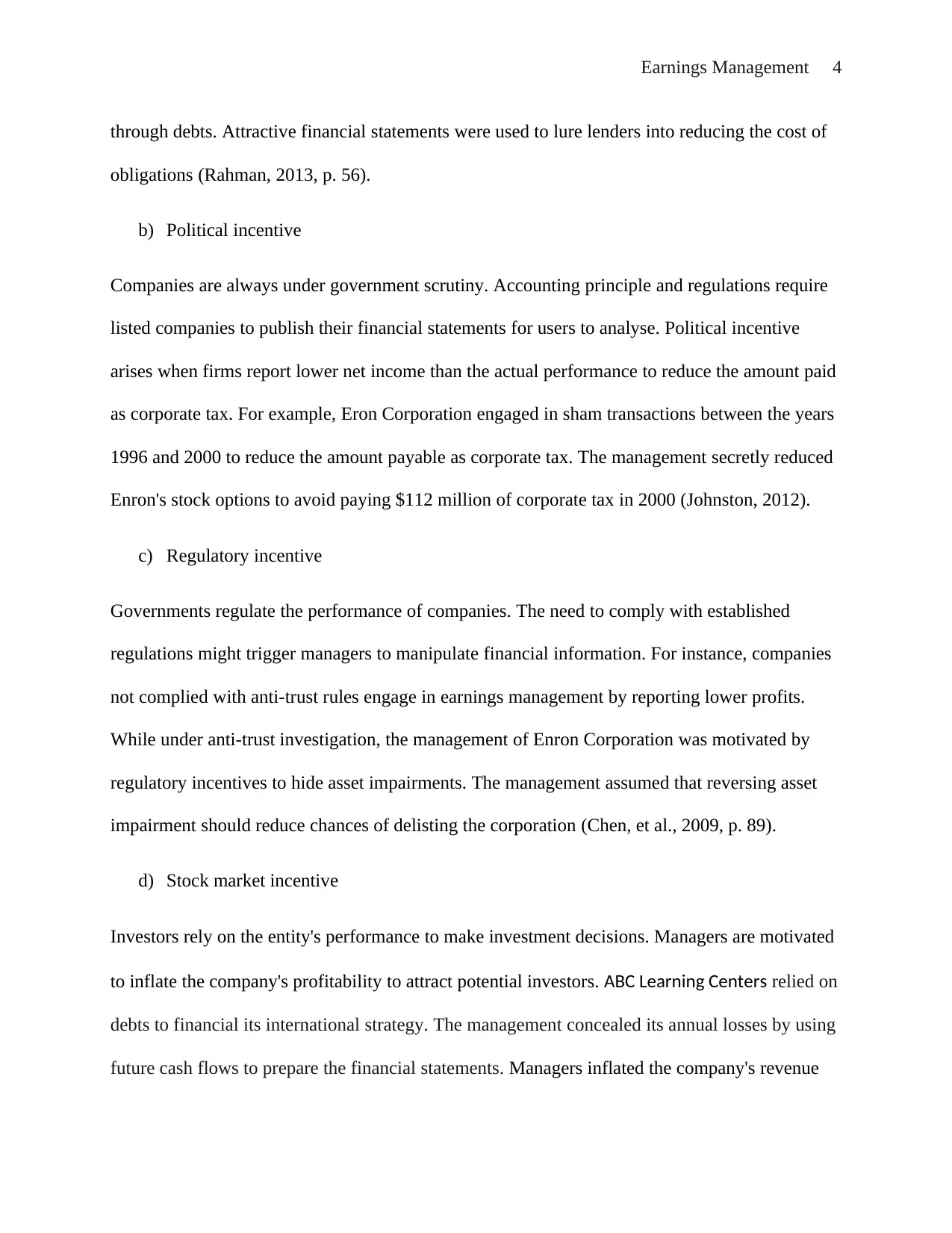
Earnings Management 4
through debts. Attractive financial statements were used to lure lenders into reducing the cost of
obligations (Rahman, 2013, p. 56).
b) Political incentive
Companies are always under government scrutiny. Accounting principle and regulations require
listed companies to publish their financial statements for users to analyse. Political incentive
arises when firms report lower net income than the actual performance to reduce the amount paid
as corporate tax. For example, Eron Corporation engaged in sham transactions between the years
1996 and 2000 to reduce the amount payable as corporate tax. The management secretly reduced
Enron's stock options to avoid paying $112 million of corporate tax in 2000 (Johnston, 2012).
c) Regulatory incentive
Governments regulate the performance of companies. The need to comply with established
regulations might trigger managers to manipulate financial information. For instance, companies
not complied with anti-trust rules engage in earnings management by reporting lower profits.
While under anti-trust investigation, the management of Enron Corporation was motivated by
regulatory incentives to hide asset impairments. The management assumed that reversing asset
impairment should reduce chances of delisting the corporation (Chen, et al., 2009, p. 89).
d) Stock market incentive
Investors rely on the entity's performance to make investment decisions. Managers are motivated
to inflate the company's profitability to attract potential investors. ABC Learning Centers relied on
debts to financial its international strategy. The management concealed its annual losses by using
future cash flows to prepare the financial statements. Managers inflated the company's revenue
through debts. Attractive financial statements were used to lure lenders into reducing the cost of
obligations (Rahman, 2013, p. 56).
b) Political incentive
Companies are always under government scrutiny. Accounting principle and regulations require
listed companies to publish their financial statements for users to analyse. Political incentive
arises when firms report lower net income than the actual performance to reduce the amount paid
as corporate tax. For example, Eron Corporation engaged in sham transactions between the years
1996 and 2000 to reduce the amount payable as corporate tax. The management secretly reduced
Enron's stock options to avoid paying $112 million of corporate tax in 2000 (Johnston, 2012).
c) Regulatory incentive
Governments regulate the performance of companies. The need to comply with established
regulations might trigger managers to manipulate financial information. For instance, companies
not complied with anti-trust rules engage in earnings management by reporting lower profits.
While under anti-trust investigation, the management of Enron Corporation was motivated by
regulatory incentives to hide asset impairments. The management assumed that reversing asset
impairment should reduce chances of delisting the corporation (Chen, et al., 2009, p. 89).
d) Stock market incentive
Investors rely on the entity's performance to make investment decisions. Managers are motivated
to inflate the company's profitability to attract potential investors. ABC Learning Centers relied on
debts to financial its international strategy. The management concealed its annual losses by using
future cash flows to prepare the financial statements. Managers inflated the company's revenue
Paraphrase This Document
Need a fresh take? Get an instant paraphrase of this document with our AI Paraphraser
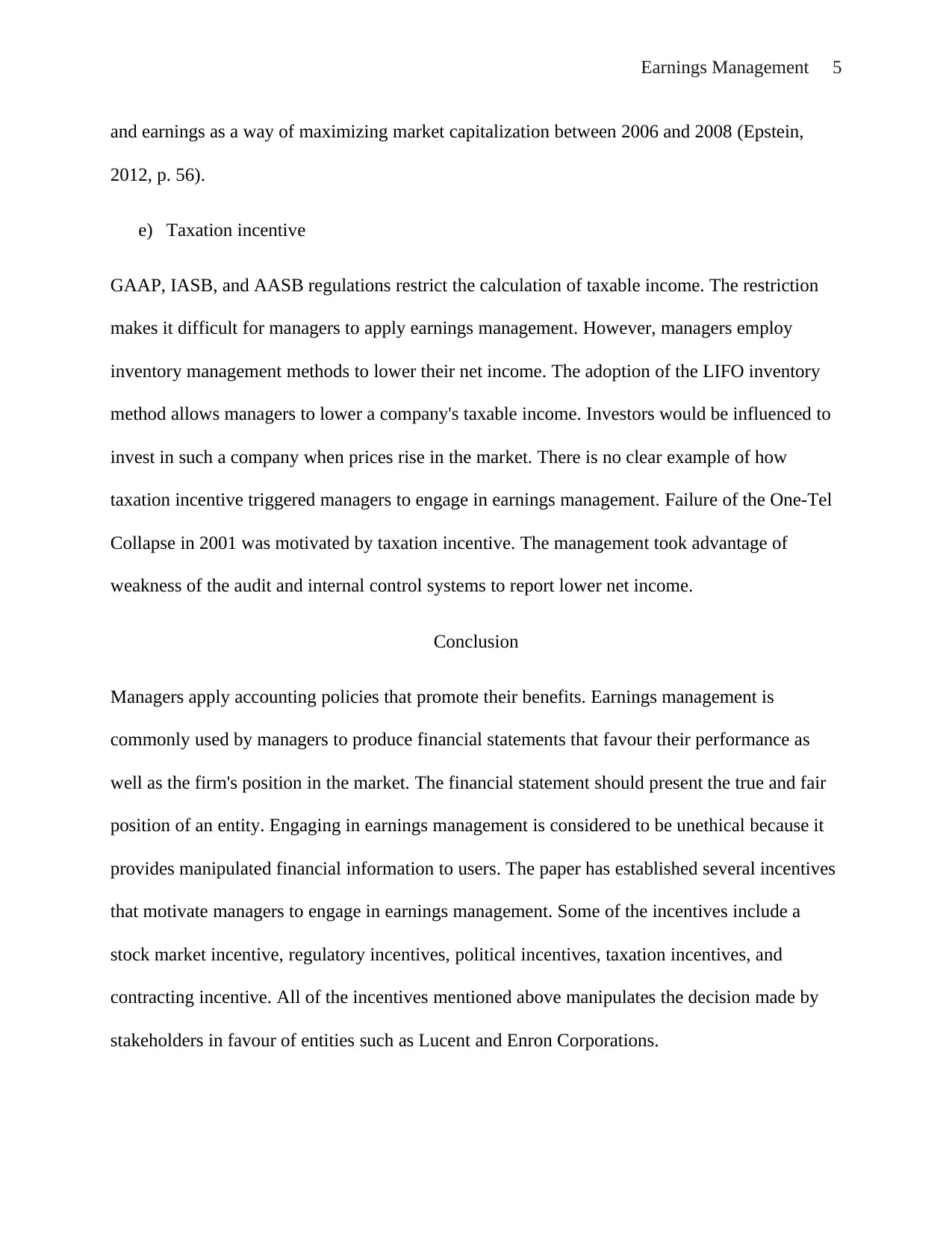
Earnings Management 5
and earnings as a way of maximizing market capitalization between 2006 and 2008 (Epstein,
2012, p. 56).
e) Taxation incentive
GAAP, IASB, and AASB regulations restrict the calculation of taxable income. The restriction
makes it difficult for managers to apply earnings management. However, managers employ
inventory management methods to lower their net income. The adoption of the LIFO inventory
method allows managers to lower a company's taxable income. Investors would be influenced to
invest in such a company when prices rise in the market. There is no clear example of how
taxation incentive triggered managers to engage in earnings management. Failure of the One-Tel
Collapse in 2001 was motivated by taxation incentive. The management took advantage of
weakness of the audit and internal control systems to report lower net income.
Conclusion
Managers apply accounting policies that promote their benefits. Earnings management is
commonly used by managers to produce financial statements that favour their performance as
well as the firm's position in the market. The financial statement should present the true and fair
position of an entity. Engaging in earnings management is considered to be unethical because it
provides manipulated financial information to users. The paper has established several incentives
that motivate managers to engage in earnings management. Some of the incentives include a
stock market incentive, regulatory incentives, political incentives, taxation incentives, and
contracting incentive. All of the incentives mentioned above manipulates the decision made by
stakeholders in favour of entities such as Lucent and Enron Corporations.
and earnings as a way of maximizing market capitalization between 2006 and 2008 (Epstein,
2012, p. 56).
e) Taxation incentive
GAAP, IASB, and AASB regulations restrict the calculation of taxable income. The restriction
makes it difficult for managers to apply earnings management. However, managers employ
inventory management methods to lower their net income. The adoption of the LIFO inventory
method allows managers to lower a company's taxable income. Investors would be influenced to
invest in such a company when prices rise in the market. There is no clear example of how
taxation incentive triggered managers to engage in earnings management. Failure of the One-Tel
Collapse in 2001 was motivated by taxation incentive. The management took advantage of
weakness of the audit and internal control systems to report lower net income.
Conclusion
Managers apply accounting policies that promote their benefits. Earnings management is
commonly used by managers to produce financial statements that favour their performance as
well as the firm's position in the market. The financial statement should present the true and fair
position of an entity. Engaging in earnings management is considered to be unethical because it
provides manipulated financial information to users. The paper has established several incentives
that motivate managers to engage in earnings management. Some of the incentives include a
stock market incentive, regulatory incentives, political incentives, taxation incentives, and
contracting incentive. All of the incentives mentioned above manipulates the decision made by
stakeholders in favour of entities such as Lucent and Enron Corporations.
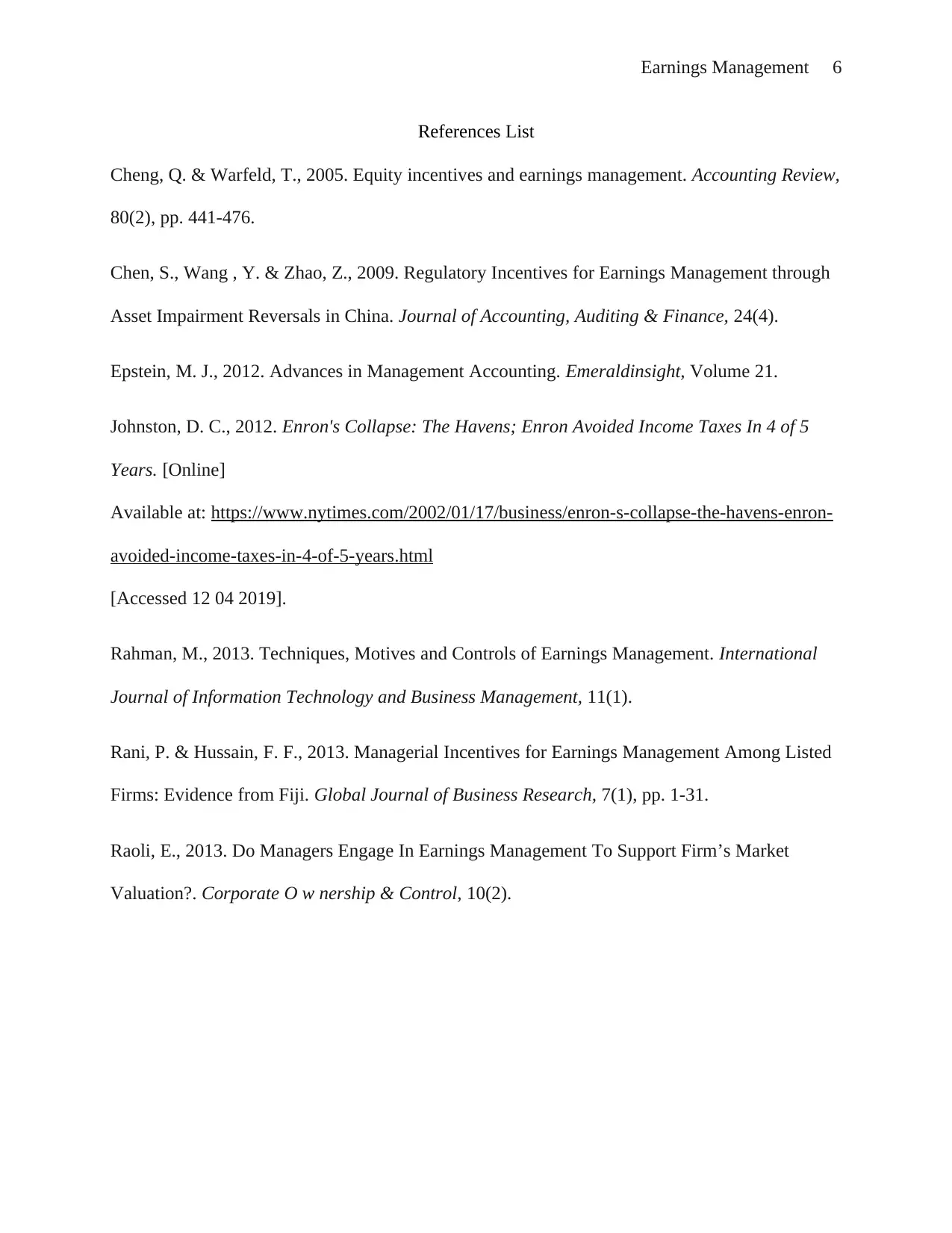
Earnings Management 6
References List
Cheng, Q. & Warfeld, T., 2005. Equity incentives and earnings management. Accounting Review,
80(2), pp. 441-476.
Chen, S., Wang , Y. & Zhao, Z., 2009. Regulatory Incentives for Earnings Management through
Asset Impairment Reversals in China. Journal of Accounting, Auditing & Finance, 24(4).
Epstein, M. J., 2012. Advances in Management Accounting. Emeraldinsight, Volume 21.
Johnston, D. C., 2012. Enron's Collapse: The Havens; Enron Avoided Income Taxes In 4 of 5
Years. [Online]
Available at: https://www.nytimes.com/2002/01/17/business/enron-s-collapse-the-havens-enron-
avoided-income-taxes-in-4-of-5-years.html
[Accessed 12 04 2019].
Rahman, M., 2013. Techniques, Motives and Controls of Earnings Management. International
Journal of Information Technology and Business Management, 11(1).
Rani, P. & Hussain, F. F., 2013. Managerial Incentives for Earnings Management Among Listed
Firms: Evidence from Fiji. Global Journal of Business Research, 7(1), pp. 1-31.
Raoli, E., 2013. Do Managers Engage In Earnings Management To Support Firm’s Market
Valuation?. Corporate O w nership & Control, 10(2).
References List
Cheng, Q. & Warfeld, T., 2005. Equity incentives and earnings management. Accounting Review,
80(2), pp. 441-476.
Chen, S., Wang , Y. & Zhao, Z., 2009. Regulatory Incentives for Earnings Management through
Asset Impairment Reversals in China. Journal of Accounting, Auditing & Finance, 24(4).
Epstein, M. J., 2012. Advances in Management Accounting. Emeraldinsight, Volume 21.
Johnston, D. C., 2012. Enron's Collapse: The Havens; Enron Avoided Income Taxes In 4 of 5
Years. [Online]
Available at: https://www.nytimes.com/2002/01/17/business/enron-s-collapse-the-havens-enron-
avoided-income-taxes-in-4-of-5-years.html
[Accessed 12 04 2019].
Rahman, M., 2013. Techniques, Motives and Controls of Earnings Management. International
Journal of Information Technology and Business Management, 11(1).
Rani, P. & Hussain, F. F., 2013. Managerial Incentives for Earnings Management Among Listed
Firms: Evidence from Fiji. Global Journal of Business Research, 7(1), pp. 1-31.
Raoli, E., 2013. Do Managers Engage In Earnings Management To Support Firm’s Market
Valuation?. Corporate O w nership & Control, 10(2).
⊘ This is a preview!⊘
Do you want full access?
Subscribe today to unlock all pages.

Trusted by 1+ million students worldwide
1 out of 6
Related Documents
Your All-in-One AI-Powered Toolkit for Academic Success.
+13062052269
info@desklib.com
Available 24*7 on WhatsApp / Email
![[object Object]](/_next/static/media/star-bottom.7253800d.svg)
Unlock your academic potential
Copyright © 2020–2025 A2Z Services. All Rights Reserved. Developed and managed by ZUCOL.




